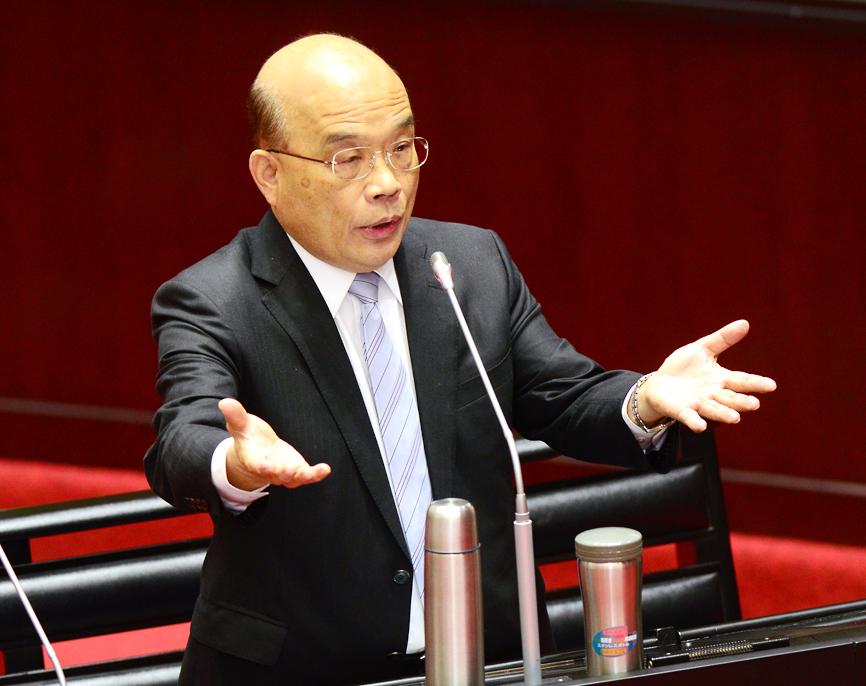China’s demand that the novel coronavirus that emerged in Wuhan, Hubei Province, not be referred to with names like the “Wuhan pneumonia” betrays its lack of confidence in itself, Premier Su Tseng-chang (蘇貞昌) told lawmakers yesterday.
Democratic Progressive Party Legislator Tsai Yi-yu (蔡易餘) asked Su, during a interpellation at the Legislative Yuan in Taipei, for his view on China’s attempts to redeem its national image in the wake of the COVID-19 pandemic.
These included China’s efforts to “bleach” its image, including having WHO Director-General Tedros Adhanom Ghebreyesus publicly praise its handling of the COVID-19 outbreak, and thanking it for buying time for the global community, Tsai said.

Photo: Wang Yi-sung, Taipei Times
Su said the term “Wuhan pneumonia” was used because the outbreak began in Wuhan, just as the way other diseases have become known by area names, such as German measles, Japanese encephalitis and athlete’s foot (known in Taiwan as “Hong Kong foot”).
China has gone to great lengths to demand acclaim for having contained the new virus, but such manipulations always backfire when overdone, Su said.
Given its history with China, Taiwan knew how important it was to be cautious when it comes to viral outbreaks and it successfully deployed early preventive measures to curb the spread of COVID-19, Su said.
Separately yesterday, Control Yuan member Peter Chang (張武修), a public health specialist who is director-general of the Global Taiwan Medical Alliance, told a radio interviewer that the WHO has become a “useless” international organization because it is controlled by China.
Underestimating the seriousness of COVID-19, Tedros on Jan. 23 refused to declare an international public health emergency, but as the number of confirmed cases and deaths rose significantly over the next five days, Canadian netizens launched a petition demanding Tedros’ resignation, Chang said.
The petition organizers hope to get 1 million signatures and have collected more than half of their target so far, he said.
Had China not silenced whistleblower Li Wenliang (李文亮) — one of the doctors who reported COVID-19 and tried to warn the Chinese government about it — the WHO could have responded earlier, Chang said.
The WHO did a great job during the SARS epidemic, because it paid attention to Carlo Urbani, an Italian doctor who gave early warnings of threat posed by the outbreak, bringing it under control within just six months, Chang said.
China has declared Wuhan a safe place, without additional COVID-19 inspections, but that is because tests are no longer being conducted in the city, he said, adding that not following proper public health standards is dangerous.
From a scientific perspective, figures about the number of new COVID-19 cases in Wuhan must be fabricated, as it is impossible that the numbers are dropping as quickly as China claims they are, he said.
Although Taiwan hopes to obtain information from the WHO, the “China-controlled” organization has almost no function at this point, he said.
Taiwan must rely on itself instead, he said.
Many European countries have bought into Beijing’s propaganda and been misled into thinking that China has changed, but it has not and much of its data remains unreliable, he added.

The manufacture of the remaining 28 M1A2T Abrams tanks Taiwan purchased from the US has recently been completed, and they are expected to be delivered within the next one to two months, a source said yesterday. The Ministry of National Defense is arranging cargo ships to transport the tanks to Taiwan as soon as possible, said the source, who is familiar with the matter. The estimated arrival time ranges from late this month to early next month, the source said. The 28 Abrams tanks make up the third and final batch of a total of 108 tanks, valued at about NT$40.5 billion

Two Taiwanese prosecutors were questioned by Chinese security personnel at their hotel during a trip to China’s Henan Province this month, the Mainland Affairs Council (MAC) said yesterday. The officers had personal information on the prosecutors, including “when they were assigned to their posts, their work locations and job titles,” MAC Deputy Minister and spokesman Liang Wen-chieh (梁文傑) said. On top of asking about their agencies and positions, the officers also questioned the prosecutors about the Cross-Strait Joint Crime-Fighting and Judicial Mutual Assistance Agreement, a pact that serves as the framework for Taiwan-China cooperation on combating crime and providing judicial assistance, Liang

A group from the Taiwanese Designers in Australia association yesterday represented Taiwan at the Midsumma Pride March in Melbourne. The march, held in the St. Kilda suburb, is the city’s largest LGBTQIA+ parade and the flagship event of the annual Midsumma Festival. It attracted more than 45,000 spectators who supported the 400 groups and 10,000 marchers that participated this year, the association said. Taiwanese Designers said they organized a team to march for Taiwan this year, joining politicians, government agencies, professionals and community organizations in showing support for LGBTQIA+ people and diverse communities. As the first country in Asia to legalize same-sex

MOTIVES QUESTIONED The PLA considers Xi’s policies toward Taiwan to be driven by personal considerations rather than military assessment, the Epoch Times reports Chinese President Xi Jinping’s (習近平) latest purge of the Chinese People’s Liberation Army (PLA) leadership might have been prompted by the military’s opposition to plans of invading Taiwan, the Epoch Times said. The Chinese military opposes waging war against Taiwan by a large consensus, putting it at odds with Xi’s vision, the Falun Gong-affiliated daily said in a report on Thursday, citing anonymous sources with insight into the PLA’s inner workings. The opposition is not the opinion of a few generals, but a widely shared view among the PLA cadre, the Epoch Times cited them as saying. “Chinese forces know full well that